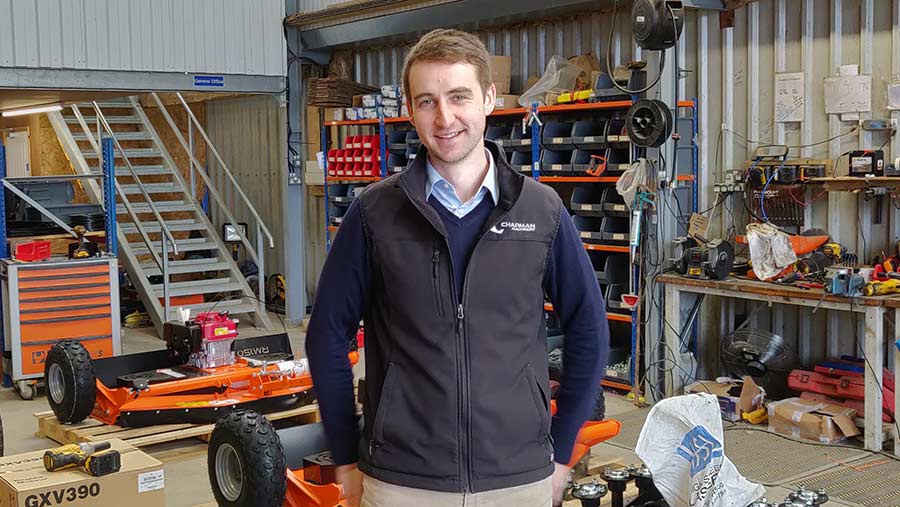Job profile: What’s it like to be an agricultural engineer?

If you have a talent for making and fixing farm kit, then a job as an agricultural engineer could be the perfect career for you. James Chapman, who founded his own firm, gives an insight into the role.
Sum up your job
I run Chapman Machinery, based near Bude in Cornwall. We make and sell agricultural, equestrian and horticultural kit, specialising in items towed behind ATVs, UTVs or 4x4s.
Basically, everything from mowers and mounted feeders to bale transporter and weed wipers.
I was a one-man band when I launched the firm in 2010, but now I employ 10 people and we make more than 600 machines a year.
What do you enjoy the most?
I’ve always been mechanically minded – I was the kid you’d find in the workshop taking objects apart to see how they worked (and occasionally putting them back together again!) – so I really enjoy the design aspect.
See also: Job profile: What’s it like to be an arable farm foreman?
What’s the downside?
Lots of factors outside of our control impact on our business, including the effect of the exchange rates on exports and the general state of uncertainty within the agricultural sector.
Running your own company is hard work and can be stressful, but having parents who were self-employed with the farm when I was growing up rubbed off on me – I needed to forge my own destiny.
What experience and qualifications are essential to the job?
Growing up on a farm is good training to be an agricultural engineer. I started as a user of machinery and then evolved into a designer, which is definitely the right way to come at it.
The best engineers are a combination of analytical, creative and practical.
You also have to keep customers uppermost in your mind because what you’re doing is trying to make their lives easier, so you need to be acutely aware of what it is they need from a machine.
I did a mechanical engineering degree at Exeter University and then had a spell working at Rolls-Royce on the defence aerospace side.
It’s a fantastic firm, but I felt like a very small cog in a big machine and wanted to get closer to farming again.
Have you ever had a eureka moment in terms of design?
Very occasionally you’ll come up with an idea that improves the product, cuts the production cost and reduces the running cost, which gives a real buzz, as it’s great for both us as a business and the end user.
But often it’s just approaching an existing problem from a fresh angle that produces the best results, and a number of incremental improvements on a design are often more effective than looking for a “silver bullet” solution.
Farmers are naturally cautious of revolutionary ideas so we can’t go too far “out there” with our designs.
Having said that, automation and data collection are going to be critical in the next few decades as farming is going to have to produce a lot more with a lot less, so these are the areas I will be focusing on.
Most embarrassing on-farm machinery moment?
A classic that I’m sure many of us have experienced.
I thought I could make it back to the yard but didn’t account for the heavy trailer I was towing.
A phone call to request more diesel definitely resulted in a few laughs.
What’s the one tool or item you couldn’t be without to do your job?
In terms of the big picture, it’s our new press brake machine, which means we can develop prototypes on-site more quickly and easily.
That will speed up our R&D capabilities, which is critical to our long-term success.
It cost the best part of £100,000, but we got financial help for about half of that from the Cornwall Development Company, which manages the innovation grants for the Agri-tech Cornwall and Isles of Scilly Project.
What’s your view on the British agricultural engineering industry?
We don’t always give ourselves enough credit.
There are lots of great products made here and a lot of very skilled people coming up with clever ideas.
I’m sensing there’s more keenness among consumers generally to support British manufacturing (it’s not always the cheapest, but you do get what you pay for), plus the weak sterling is helping the export trade.
What advice would you give to someone wanting a similar role?
Get relevant work experience.
Give us an idea of salaries
As a guide, graduate engineering roles pay £25,000-£30,000.
Some of the agricultural companies are smaller, though, so their starting salaries may be less, but with more opportunities to progress.
If you run your own company, the potential rewards are high, but so too are the risks, as there are huge capital costs if you are manufacturing at scale.
Some of the country’s best engineers are actually farmers, and overall there is probably more potential to make a decent income from machinery than there is from farming at the moment.

